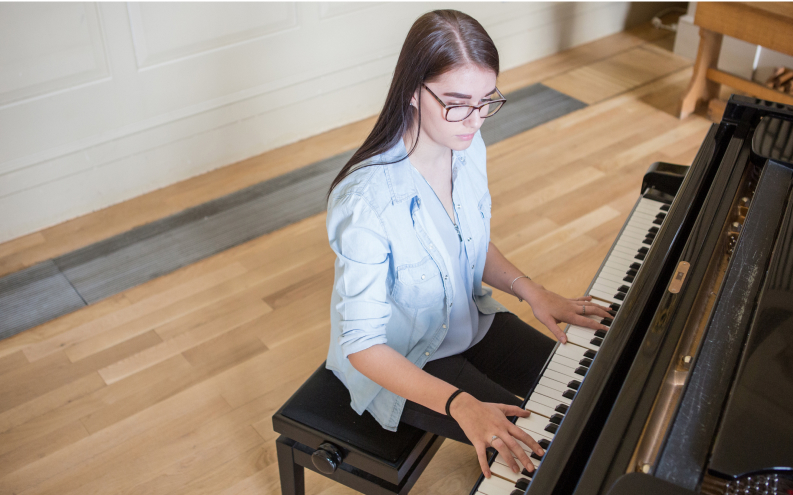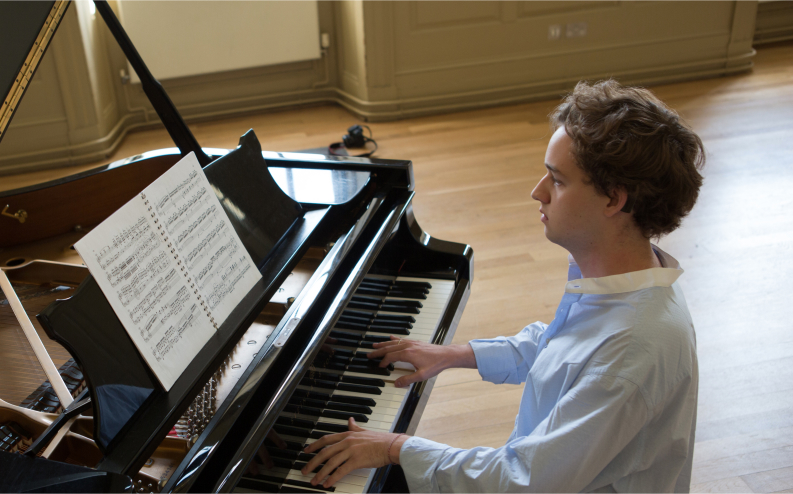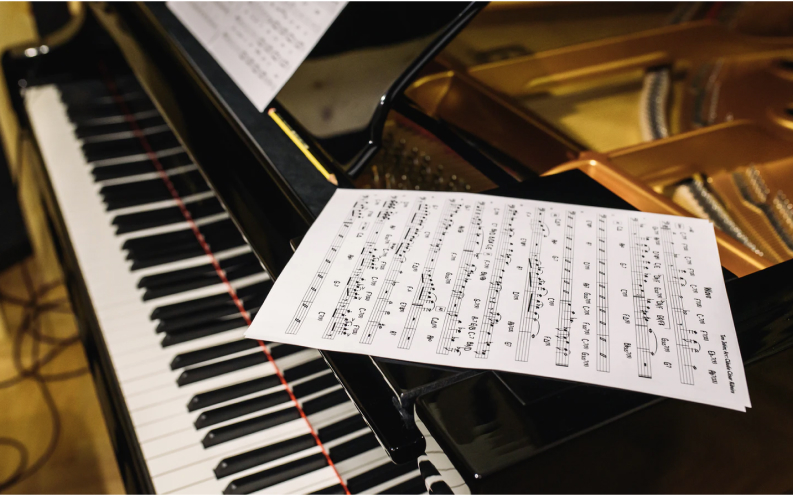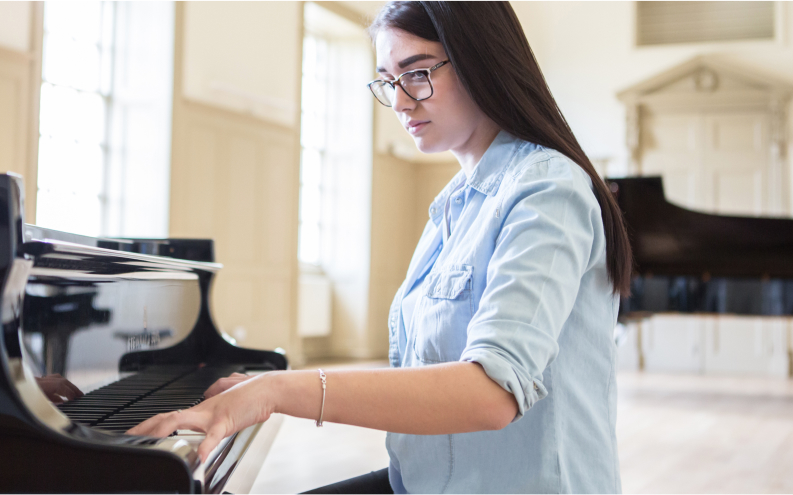To play on unfamiliar pianos. To play in uncomfortable settings – when you're tired, when you're hungry, when your hands are freezing from the cold.
Fiona Sloane
Private teacher
DOWNLOAD FREE PIANO RESOURCES & THE PIANO 2021-2023 SYLLABUS
An important part of any piano teacher’s role is preparing students physically and mentally for their exams. We were eager to find out the strategies our surveyed teachers employ to give their students the skills and confidence to perform at their best under pressure.
1
Many teachers, such as Janice Gow who has over 40 years of piano teaching experience, highlighted the importance of students learning to play in front of friends and family. This means not only playing the pieces, but practising taking their time in front of others. Janice Gow offers students this helpful advice:
Perform for friends and family often… View it as a performance – the examiner is the audience so make him/her happy. Be a musician not a perfectionist...and plan for something nice after an exam no matter what happens.
Janice Gow
Private teacher

To play on unfamiliar pianos. To play in uncomfortable settings – when you're tired, when you're hungry, when your hands are freezing from the cold.
Fiona Sloane
Private teacher
Another technique employed by many teachers is to then play in front of strangers in an unfamiliar setting; this helps to mimic exam conditions and get pupils used to playing in new spaces with different acoustics.
This is so that, no matter what the conditions on the day, nothing comes as too much of a shock. Adrian Rea, likewise, suggests getting learners outside of their physical comfort zone:
I try to put my students in a performing setting such as a piano gig – I slot them into it to perform their pieces so they get used to playing for strangers.
Adrian Rea
Private teacher
The goal is to differentiate between ‘practice’ and ‘performance’. This is really important and ultimately the defining factor when comparing an outstanding exam entry with a merely passable one. Beyond practising pieces, Laura Bryan uses a fun tactic with her students to prepare for the technical exercises:
I always suggest [putting] pieces of paper with scales written on into a pot and picking them out at random to simulate being asked by the examiner.
Laura Bryan
Private teacher
2
Getting learners into the habit of practice before their exam, warming up and doing their technical exercises is key. It’s tempting to overly practice the sections they’re good at, but Iris West suggests:
Take time to practise the hard sections before playing the full pieces. I tell students to practise the moves they find difficult, do it with them and then let them try with their eyes shut which builds confidence.
Iris West
Private teacher

Don’t overplay your pieces or rush them. Be consistent.
Laura Bryan
Private teacher
It could be beneficial for students to get to the point where they’re so confident with their pieces that they can play them by heart or with their eyes closed. It’s important to keep some of the spontaneity alive however, so the pieces don’t sound lifeless.
Training pupils into taking a few seconds to focus on the piece they’re about to play was a popular piece of advice. This is especially important when switching from one genre and tempo of piece to another – going over the story they’re about to tell can really help them express the musicality of the piece. Steph Milne, a piano teacher based in New Zealand, encouraged fellow teachers to:
Remind students to focus on body alignment and posture, plus taking extra time to breathe at the beginning of pieces.
Steph Milne
Private teacher
Taking time for some physical warm-ups pre-exam is also something that many students forget about, yet many teachers, like John Ennis, mentioned it in our survey:
Before the exam, relax the hands by your side, shake them a little to get the blood flowing.
John Ennis
Private teacher
3
No matter what the exam board, the articulation of character is something all examiners are looking for in pieces played by candidates.
Learners need to treat the pieces as separate entities with individual moods to communicate. Sheila Collins, who has 25 years of piano teaching experience tells her students to:
Practise pausing before performing to ‘think’ about the character of each piece, take some deep breaths to help combat nerves.
Sheila Collins
Private teacher

I remind students to go into an exam trying to achieve one personal goal: to aim to convey a musical story to the examiner.
Robyn Good
Private teacher
One tip is to encourage students to play other pieces in different genres in between their exam pieces to help them re-centre. Sim Pei Ling sees the benefits of this with her students:
Inspirations from playing a new piece even during exam preparation time. New pieces can actually assist in the improvement of one's sight-reading and at the same time [be] therapeutic.
Sim Pei Ling
Private teacher
A really beneficial task is for learners to record themselves playing their exam pieces and listen back to their style; playing is very different to listening, and it can be amazing to see the realisations students have during this exercise. Private piano teacher, Alina Abraham suggests:
Take self recordings, focusing on a particular issue, such as characterisation or timing, then we analyse together and further develop from here.
Alina Abraham
Private teacher
4
Contrary to what many teachers and students think, exam boards want candidates to focus on musicality and fluency, rather than if the odd mistake is made. This is well worth reminding students of on the run-up to their exams. Steph Milne says this can help with anxiety:
Students need to practise visualizing their chosen performance style and 'moving into the music' ahead of their exam – this is where anxiety is lost.
Steph Milne
Private teacher

They need enough sleep, lots of water, and no sugar before the exam.
Ellen McQuilkin
Private teacher
Teaching students techniques to self calm – especially when you might not be there on the day with them – is really important. Irita Kutchmy reassures her students in this way:
I always tell them that it is fine to make mistakes and to forgive themselves and keep calm and carry on, rather than worrying about them. If they have done the correct amount of preparation then a few mistakes will not mean they won't pass.
Irita Kutchmy
Private teacher
Elaine Goh echoes this with her students:
I encourage students to play as musically as possible and not to worry about the odd little slip. I remind them that if everyone automatically failed their exam because they played a wrong note then no-one would ever pass!
Elaine Goh
Private teacher
Practising in smart ways so that students don’t feel fearful of certain sections can make a real difference, as Brian Larter explains:
If there are unresolved challenges, psychologically they will always have that fear of parts of their pieces which will inhibit their performance. There will always be something to challenge one in a piece, but if it is understood then the fear goes away.
Brian Larter
Private teacher
And finally – it’s worth reminding students to take self care seriously on the run up to an exam.
Return:
Home